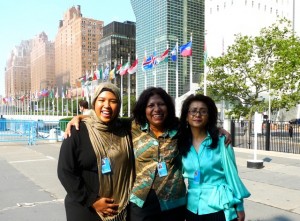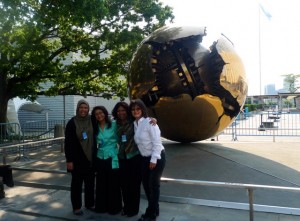-
Advocacy Theme
-
Tags
- Abortion
- Adoption
- Caregiving
- CEDAW
- Disability
- Domestic Violence
- Domestic Workers
- Harassment
- Healthcare
- Housing
- International/Regional Work
- Maintenance
- Media
- Migrant Spouses
- Migrant Workers
- Muslim Law
- National budget
- Parental Leave
- Parenthood
- Polygamy
- Population
- Race and religion
- Sexual Violence
- Sexuality Education
- Single Parents
- Social Support
- Sterilisation
- Women's Charter
Our CEDAW team speaks at the United Nations
July 18th, 2011 | Employment and Labour Rights, Gender-based Violence, News, Women in Leadership
This year marks the third time that AWARE is submitting a Shadow Report to the United Nations committee on the Convention On The Elimination Of All Forms Of Discrimination Against Women (CEDAW).
On July 18, our CEDAW team made their presentation to the UN CEDAW Committee at the UN headquarters in New York, highlighting areas where women’s rights in Singapore still need improvement.
The AWARE delegation comprises: AWARE CEDAW Sub-Committee chair Braema Mathi, who is also AWARE’s Research & Advocacy Director; AWARE Vice-President Halijah Mohamad; AWARE immediate past president Dana Lam; and AWARE research executive Nadzirah Samsudin.
The following is a transcript of AWARE’s oral presentation at the UN’s CEDAW Session For Non-Governmental Organisations (Singapore):
Thank you, Madam Chair, and a very good afternoon to all CEDAW Committee members.
I am Braema Mathi, Chair of the CEDAW Committee in AWARE, a 26-year-old women’s advocacy group who framed and coordinated AWARE’s second and now the third Shadow Report.
Supporting my NGO colleagues who spoke on marginalised issues, I am raising five areas of concerns from a national perspective.These are:
A. Reservations
B. National Machineries
C. Women & Employment
D. Discrimination: Vulnerable Groups
E. Body Image
A. RESERVATIONS
The Singapore government’s assertions for exclusion from compliance with certain CEDAW obligations
1. We welcome the Singapore government‘s decision to partially withdraw the reservations to Articles 2 and 16, which relate to national and international dimensions of state obligation and marriage and family life respectively (see paragraph 6 of the government’s response, May 18, 2011).
This is still not good enough, but we can see current limitations for a total withdrawal of the reservations to these Articles.
So, Madam Chair, we ask that the government give a clear timeline for the withdrawing of all reservations, and so work towards amending local laws and the Constitution to include ‘gender’ and ‘marital status’ (see AWARE’s Shadow Report, page 31, paragraphs 2.11 to 2.18).
2. We are appalled by the government’s rationale for maintaining the reservations on Article 11, which relates to employment (see paragraph 7 of government’s response, May 18, 2011).
Safety at the workplace is not a conserve for women. It is equally important to protect our men from hazardous materials and so ensure that their reproductive capabilities are not jeopardised in any way. Total Fertility Rate is boosted by both men and women!
We also say that many (see paragraph 30 of the government’s report, May 18, 2011) women are contributing to nation-building as volunteer-leaders in the community. Their service needs formal recognition through a broader definition of National Service that extends beyond the military.
We say that reservations on Article 11(1) and the Employment Act should be amended to offer protection to a wider group of female employees (AWARE’s Shadow Report, page 86, paragraph 11.21; and page 105, paragraph 11.74).
B. NATIONAL MACHINERIES
These relate to Articles 1 to 4, which cover the definition of discrimination, law, policy and measures to implement CEDAW
1. Singapore is changing today, Madam Chair. There is a stronger civil society, which has resulted in some dramatic changes at the recent elections. The Prime Minister, in his post-elections speech, has called for greater consultations with grassroots organisations, etc.
Thus, we find it unacceptable that the government wishes to confine its consultations and dialogues to three approved bodies on women’s issues: the Singapore Council of Women’s Organisations, the People’s Association Women’s Wing and the National Trades Union Congress (NTUC) Women’s Committee and Women’s Development Secretariat, as recently announced by the Ministry of Community Development, Youth and Sports (henceforth referred to as MCYS).
This particular approach ignores the good work and advocacy of many interest groups that work on diverse women’s issues, such as women with HIV, sexual orientation, migrant workers, lower-income women, foreign wives, and foreign domestic workers. Their independent voices are needed at the table of constructive dialogue.
2. MCYS has recently elevated the Women’s Desk to the Office of Women’s Development. This is a good move, though still limiting, as this office is placed in the Family Division unit of the Ministry.
Women of today can be married mothers, divorced mothers, single unwed mothers, foreign wives still struggling to become Singapore citizens, foreign domestic workers, and foreign women in the service industry. We exhort that this Office be made into an independent body, outside of this Family Division unit.
It can be housed under, say, the Gender Equality Division, functioning on its own Budget (see AWARE’s Shadow Report, page 21, paragraph 1.17), for all matters related to gender mainstreaming as a policy approach and for producing data that is sex-, age- and ethnicity- disaggregated. Currently, the budget allocation to gender matters remains opaque.
C. WOMEN & EMPLOYMENT
1. There are still no clearly defined measures to deal with getting more women to level-up in the work force beyond horizontal segregation (see AWARE’s Shadow Report, page 86, paragraphs 11.24 to 11.26).
Women, despite being well-educated, still hold the lower-end to middle-level jobs and earn less than men (see AWARE’s Shadow Report, page 45, paragraph 5.9; and page 90, paragraph 11.34; and page 110, paragraph 11.91).
Work-life balance practices such as flexible work arrangements are not consistently available. There are still inadequate support services (see AWARE’s Shadow Report, page 86, paragraphs 11.25, 11.50, 11.55 and 11.92) to alleviate care-giving responsibilities (paragraphs 11.59 and 11.94) and an over-reliance on employing foreign domestic workers as a measure to keep women in the workforce.
D. DISCRIMINATION: VULNERABLE GROUPS
1. Pregnant women, women who are sexually harassed, foreign domestic workers, foreign wives married to Singapore men, sexual minorities, casual and contract workers, are still inadequately protected. The improved Employment Act still excludes too many women at risk (see AWARE’s Shadow Report, page 104, paragraph 11.70).
2. Foreign women – foreign brides, foreign female workers (migrant labour) and foreign women in the sex industry, all have limited protection under the law, limited access to under-funded social services, are caught in cross-border issues and run the risk of being classified too often as immigration offenders. (see AWARE’s Shadow Report, page 53, paragraphs 5.34 to 5.35; and page 159, paragraphs 19.18 to 19.20). It is a State Obligation to remove these forms of discrimination.
E. BODY IMAGE
1. AWARE is distressed by the apparent lack of adequately enforced guidelines against medical practitioners, those in the beauty industry, and advertisers who blatantly flaunt their wares (see AWARE’s Shadow Report page 50, paragraphs 5.22 to 5.24; and page 46, paragraphs 5.11 to 5.12).
2. Foreign women – wives and migrant women – are particularly prone to stereotyping: as being ‘submissive’, ‘virgins’, obedient workers, etc. This only adds to the negative imaging of the women (see AWARE’s Shadow Report page 47, paragraph 5.15).
We thank the CEDAW committee for the time and appreciate the Concluding Observations of 2007. There are more details in our report that we hope will be useful to the work at hand. Thank you.
OTHER ISSUES
F. WOMEN IN POLITICAL & PUBLIC LIFE
1. We are aggrieved that after 46 years of independence, we still do not have a full-fledged female Minister. We state that we have good, capable women Members of Parliament (MPs) who have shown their mettle. Yet, after the recent elections, we have seen inexperienced male MPs being immediately given Ministerial positions. We state our disappointment that proven MPs such as Madam Halimah Yacob, Dr Amy Khor, Ms Grace Fu, who have already shown their capability and capacity, were made Ministers of State or Senior Ministers of State.
G. HEALTHCARE FINANCING
1. We are concerned about the proportion of healthcare financing that an individual has to bear and that over 25 per cent of bill has to be borne as ‘out-of-pocket’ expenses. This leaves an ageing population with low disposable incomes or savings vulnerable to steering clear of medical attention. Older women who succumb to life-long disabling illnesses, in particular, will be vulnerable (see AWARE’s Shadow Report, page 117, paragraphs 12.2 to 12.6).
H. FINANCIAL SECURITY
1. Women generally earn less, save less and enjoy less coverage under the Central Provident Fund Savings scheme. Yet, having access to housing or support for families is conditional on a slew of criteria that leaves a woman who is in need very vulnerable to falling through the social protection floor (see AWARE’s Shadow Report, page 135, paragraph 13.8).
I. VIOLENCE AGAINST WOMEN
1. We are concerned over the efficacy of how data is collected and mined within social service agencies when women ask for assistance after being abused (see government’s response, paragraph 36, May 18, 2011). A survey done by a local NGO shows discrepancies (see AWARE’s Shadow Report, page 153, paragraphs 19.3 to 19.6). It is also not possible for rape kits to be administered till the ‘victim’ files a report with the police, which can be take some time (see AWARE’s Shadow Report, page 162, paragraph 19.29).
On July 22, representatives from the Singapore government made a presentation to the UN CEDAW Committee, reporting on the progress the State has made with regards to compliance with CEDAW. Read highlights from this session here.
Based on the report from the State, as well as those from non-governmental organisations like AWARE, the UN CEDAW Committee will review Singapore’s progress with regards to eliminating discrimination against women, identifying areas of concern and making recommendations for progress.
Watch this space for more updates about Singapore’s compliance with CEDAW. In the meantime, check out AWARE’s full CEDAW Shadow Report here.
2 thoughts on “Our CEDAW team speaks at the United Nations”
Comments are closed.







Update from New York:
The Government delegation led by MOS Madam Halimah Yacob arrived yesterday. Singapore will report to the CEDAW Committee on 22 July. Singapore NGOs have today and tomorrow left to lobby the Committee on issues we wish to raise.
Update from the UN:
This is the last day for lobbying the CEDAW Committee. After several days of trying and of high anxiety we have finally met with the Committee member who is the rapporteur for Singapore and who will be influential in drafting the Committee’s Concluding Comments for Singapore. We give our lunch briefing in a couple of hours to Committee members. The Government will be reporting to the Committee tomorrow from 10a.m. to 5p.m. tomorrow. From what we have been observing of the other country reports, it will be a grueling few hours for the delegation in the hot seat.